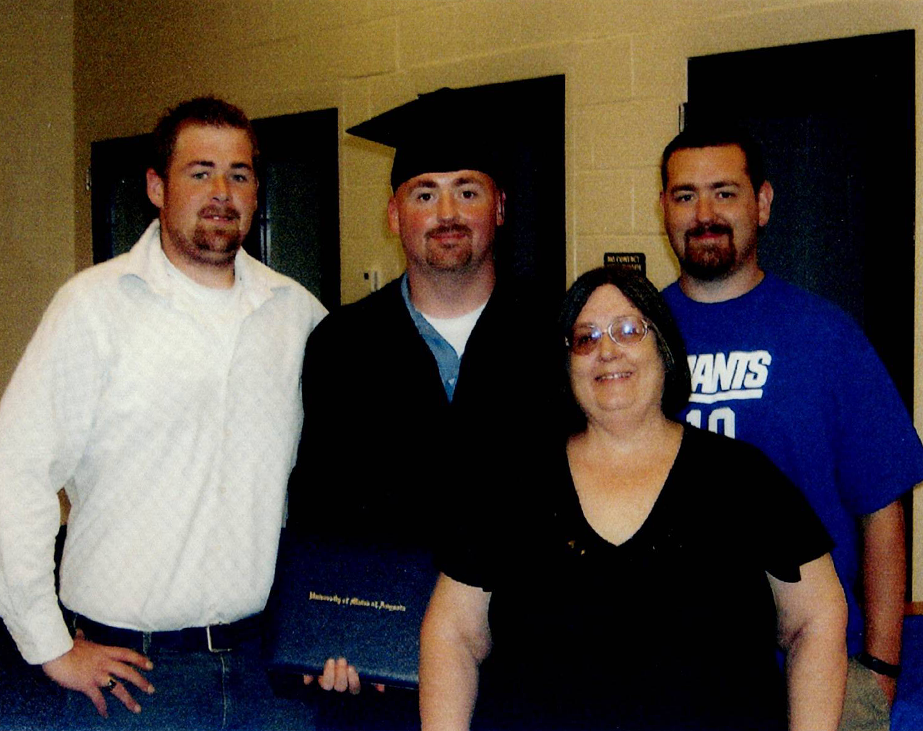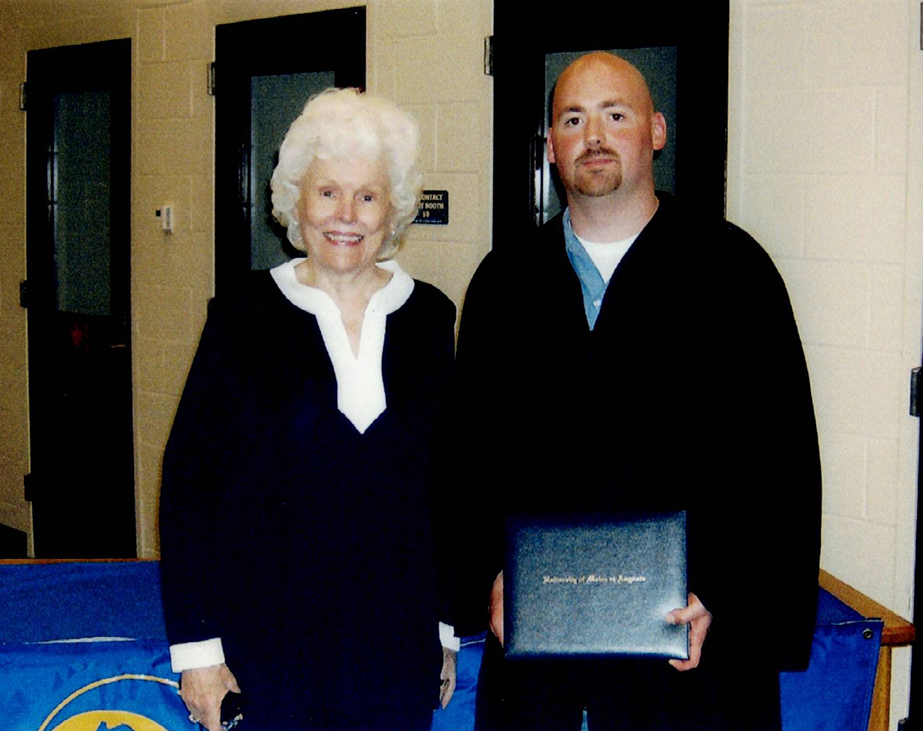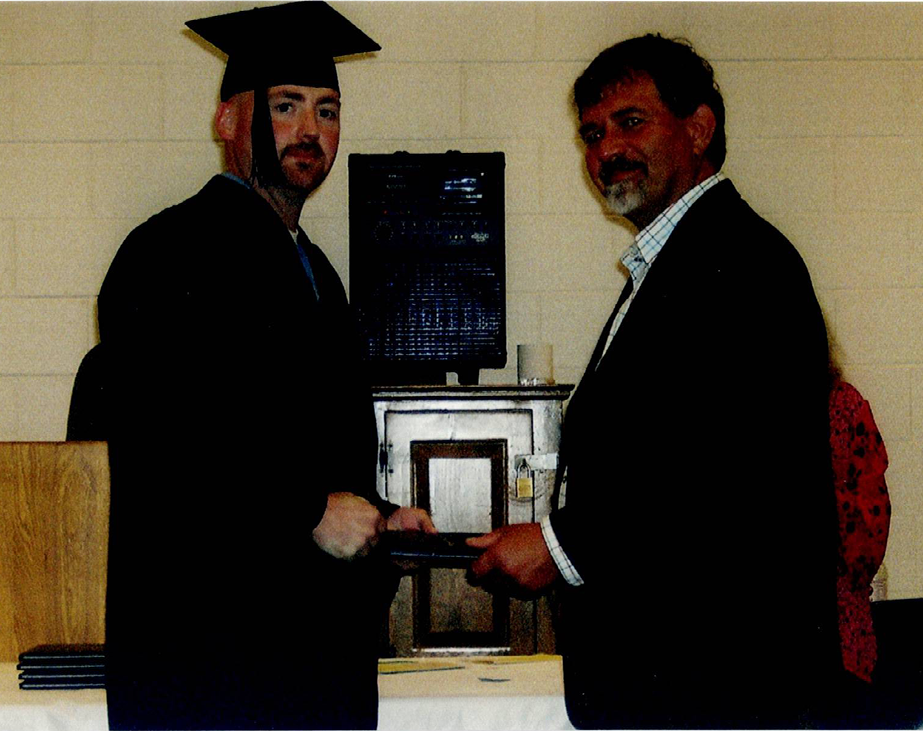 Being able to share these experiences with my family certainly means a lot to me. I’ve had opportunities to thank my mother and brothers for their ongoing love and support as I received my diploma or presented a piece of scholarly work at a symposium. I talk to my mother every week, and just about every conversation we have starts with her asking, “How’s school?” It may seem like a simple question, but that semblance of normalcy means more than I can put into words.
Being able to share these experiences with my family certainly means a lot to me. I’ve had opportunities to thank my mother and brothers for their ongoing love and support as I received my diploma or presented a piece of scholarly work at a symposium. I talk to my mother every week, and just about every conversation we have starts with her asking, “How’s school?” It may seem like a simple question, but that semblance of normalcy means more than I can put into words.
Many of my fellow students have shared similar experiences, with some saying that events like graduations are the first time they’ve felt proud and seen pride in the faces of loved ones in a long time. I’ve watched many men cry when addressing their mothers, fathers, siblings, and especially their children. I will never tire of watching men who experience feelings of guilt because they can’t play bigger roles in their children’s lives or worry that their children think of them as failures see the inspired looks in their children’s eyes when they graduate or present their work at a symposium. These types of events pay dividends because they give other residents opportunities to see the many benefits education offers.
When others see students taking pride in their work, becoming more confident, developing new skills, or growing as individuals, they want to get involved too. When people have something to strive for, they start changing their thinking and behaviors. Once enrolled, they tend to maintain those behaviors so that they can stay in the program. It’s probably not a coincidence that there’s been a noticeable decline in serious incidents at the prison over the years.
It would be irresponsible to say that those numbers are down solely because of the college program. The Maine DOC has made other changes that have helped to make facilities safer. But it would be equally irresponsible to overlook the role that the college program has played. Even staff members who once may have questioned the merits of letting people attend college while incarcerated are acknowledging the positive impact of educational programs. Some have told me that they’ve watched men who seemed unlikely to change their ways ultimately succeed in getting onto more positive pathways through participation in the program.


 Higher education in prison changed my life, period. That’s not hyperbole; it’s simply a fact.
Higher education in prison changed my life, period. That’s not hyperbole; it’s simply a fact. Being accepted into that program finally gave me something to be proud of, and it gave me a feeling of hope for the first time in years. But that feeling didn’t last long. My first two college classes were biology and ethics, and I scored a 38 (out of 100) on the first biology test.
Being accepted into that program finally gave me something to be proud of, and it gave me a feeling of hope for the first time in years. But that feeling didn’t last long. My first two college classes were biology and ethics, and I scored a 38 (out of 100) on the first biology test. Being able to share these experiences with my family certainly means a lot to me. I’ve had opportunities to thank my mother and brothers for their ongoing love and support as I received my diploma or presented a piece of scholarly work at a symposium. I talk to my mother every week, and just about every conversation we have starts with her asking, “How’s school?” It may seem like a simple question, but that semblance of normalcy means more than I can put into words.
Being able to share these experiences with my family certainly means a lot to me. I’ve had opportunities to thank my mother and brothers for their ongoing love and support as I received my diploma or presented a piece of scholarly work at a symposium. I talk to my mother every week, and just about every conversation we have starts with her asking, “How’s school?” It may seem like a simple question, but that semblance of normalcy means more than I can put into words. Just as the college program became a way for people to focus their attention and change their behaviors, I believe that access to quality jobs could have a similarly transformative impact on the prison environment and culture. I’ve witnessed men change their behavior to get “well-paying” prison jobs, which usually offer wages of just $200 to $300 per month. So I have no doubt that residents will be even more motivated by the opportunity to get jobs where they can earn enough to support themselves and their families.
Just as the college program became a way for people to focus their attention and change their behaviors, I believe that access to quality jobs could have a similarly transformative impact on the prison environment and culture. I’ve witnessed men change their behavior to get “well-paying” prison jobs, which usually offer wages of just $200 to $300 per month. So I have no doubt that residents will be even more motivated by the opportunity to get jobs where they can earn enough to support themselves and their families.